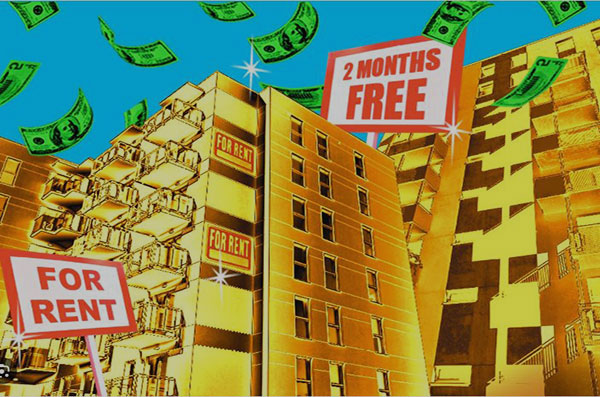Emily Nations found her slice of the good life in April. After her Nashville-area apartment flooded for a third time earlier this spring, she started to look around for a new place to live. She briefly thought about buying a home a few years ago, but that wasn't even a consideration this time around - the costs of a down payment and mortgage were too steep. Instead, she ditched her old lease and signed on at a brand-new apartment complex just north of downtown.
"The market is insane right now," Nations, a 31-year-old who works in hospitality, told me. "It makes no sense to even try and buy."
It may not be an entire home, but there's plenty to love about her one-bedroom unit - the vaulted ceilings, the "huge" walk-in closet, the natural light that spills through her windows. Outside her four walls, the chic collection of modern farmhouse buildings known as Livano Trinity offers a ton of perks: a sprawling gym, a pool with a cabana for weekend hangs, private office spaces, and even doggy day care. An on-site coffee shop serves up free daily brews to first-year tenants, while a New York-style bodega satisfies her late-night cravings.
The final kicker for Nations was the discount she got for signing: two months free. While she'll pay $1,500 in rent most months, she paid only a $95 community fee plus utilities in May and June. In the meantime, she's stashing away funds in case she decides to purchase a home down the line.
Buying a home has never been a cakewalk, but the hurdles to ownership seem more daunting than ever these days: The typical mortgage rate is hovering near a two-decade high, and there are still roughly 30% fewer homes on the market than in 2019. The median sale price reached a record $390,613 in May, according to Redfin. By contrast, a wave of apartment construction has flooded once hot markets with new studios and two-bedrooms, forcing property managers to extend olive branches if they want to lure tenants through their freshly installed doors. Step inside a newish building in places like Nashville, Salt Lake City, or Atlanta, and you'll find leasing agents hawking discounts: Eight weeks free! No fees! Comped parking! That's to say nothing of amenities such as boxing gyms, rooftop pools, and plush lounge rooms. Renters finally have some leverage - especially if they can afford the latest and greatest units.
These apartments aren't cheap, sure, but they can feel like bargains compared with the costs of buying and maintaining a home right now. Household incomes have grown faster than rents over the past year, and tenants making more than the median income now benefit from more options thanks to the influx of new apartment units. Given the divergence, more and more Americans with a taste for the finer things in life and a little cash to spare are opting to ren
Homeownership is synonymous with wealth in America - rich people live in the land of mortgage payments, not rent checks. This setup has an easy logic to it: Homeowners enjoy equity gains and a sense of stability that rentals simply can't provide. But given the costs of breaking into the for-sale market, combined with the recent deals offered on many apartments, that assumption may be flipped on its head.
Landlords have always dangled concessions like rent discounts or perks in front of tenants, but the recent building boom is now paying dividends for renters looking to land a deal. Early in the pandemic, cheap borrowing rates and soaring rents encouraged developers to put shovels in the ground - more than 1.6 million new apartment units hit the market between 2020 and 2023, Yardi Matrix, a data and research firm for commercial real estate, found. The company expects another million or so units to be completed in 2024 and 2025, which would equal levels not seen since the 1970s. Much of this construction is concentrated in the kinds of sunny, cheap places that everyone dreamed of moving to during the pandemic: Houston, Atlanta, Austin, Phoenix, and Charlotte, North Carolina, among others. This boom in supply means that people in these markets may not be so desperate to land just any open unit, forcing landlords to cut deals. The typical asking rent nationwide is up only 0.7% from last year, according to Yardi Matrix, and markets such as Austin; Raleigh, North Carolina; and Tampa, Florida, have seen rents drop over the past three months. About one-third of rentals listed on Zillow are offering concessions, compared with about 10% in 2019.
"This is a much more commonplace tactic that landlords and property managers are using to get people through the door," Nicole Bachaud, a senior economist at Zillow, told me. "They're like, 'Hey, ignore that high rent price. Look, you can have this nice free thing up front.'"
Developers these days tend to focus on building new class A units, an informal classification that encompasses the newest, nicest buildings with the best amenities, which typically rent for about 30% more than class B and C units. The result is that class A units account for more than half the apartment market, compared with one-third in the early 2000s, according to Moody's Analytics. At the same time, the number of high-income renters - those earning more than $150,000 - jumped by 82% between 2015 and 2020, a RentCafe analysis of Census Bureau data found. Rich renters simply have more choices than moderate- and low-income earners.
Joel Sanders, the founder and CEO of Apartment Insiders, a Nashville firm that helps renters like Nations find new digs free of charge, told me the city's apartment market was seeing its largest supply increase ever, which has nudged landlords to pursue a "heads in beds" strategy that favors filling units rather than jacking up rents. That bodes well for his clients.
"We have people that have the incomes, make multiple six figures, but they still value getting these deals," Sanders told me.
High-end apartments that offer amenities up the wazoo - and rent breaks, to boot - represent a tantalizing alternative to the for-sale market right now. Recent shifts in the housing market mean that the holy grail of homeownership is looking more and more like a poisoned chalice. While the number of homes for sale is rising, many sellers are loath to budge on prices after watching all their neighbors cash in during the market's peak. And the combination of spiking mortgage rates, eye-watering home prices, and increased postpurchase costs for things like maintenance and insurance has tipped the buy-versus-rent debate firmly in favor of cutting rent checks.
"The cost of renting far beats the cost of owning," Doug Ressler, the manager of business intelligence at Yardi Matrix, told me. "If I'm a guy that really wants to try and pinch my pennies and not really be tied down to a home, per se, that's what I'm going to look at."
And renters can put those cost savings to work. Sure, they may be missing out on the value of building equity in a home, but David Brasington, an economist at the University of Cincinnati, previously told Business Insider that average returns in the stock market over the past 50 years had well-outpaced home-equity gains (though he also noted that the stock market is more volatile and doesn't provide you with a place to lay your head at night). Renters may choose to sock away money for a better time to buy or invest the funds they'd otherwise be spending on stuff like a new roof or interest on a home loan.
The sheer number of new units hitting lease-up right now is enough to encourage apartment operators to continue offering perks to draw in new tenants and prevent the existing ones from jumping to the next best thing. But as with all good things, the golden age for America's wealthy renters must also come to an end. While the number of multifamily units expected to be completed next year is a still robust 459,000, according to Yardi Matrix, the end of this construction wave is in sight. Developers are feeling the pinch of higher interest rates and are wary of flooding markets with more supply. As a result, they were on pace to start construction on 245,000 units this year as of March, according to the Census Bureau, down from highs of more than 600,000 in 2022. This means that you can expect the sweetheart deals for renters to trail off near the end of 2025 and into 2026, Ressler told me.
"The supply cliff is going to come real soon," Ressler told me. "In other words, starts are already slowing down."
The upside for renters, though, is that the cliff hasn't arrived yet. Those in the market can expect more options and better bargains than what was on offer just a year ago, particularly if they're eyeing a top-end unit in a city with a lot of construction cranes on the horizon. So, for now, the formula for wealthier lessees is straightforward: Ride out the good times, sock away the extra cash that isn't going toward plumbing fixes or gym memberships, and check back in on the homebuying landscape when the rental market heats up again.
Nations told me she still hoped to buy a home one day. But the timeline of her parents' generation - get married, buy a house, have kids - no longer matches the reality for her or many of her peers, she said. Luckily, though, she had another option.
"I know how challenging it is to rent in Nashville, especially on your own," Nations told me. "If you don't have a roommate or a partner, it can feel overwhelming and impossible. This was literally an answered prayer."








